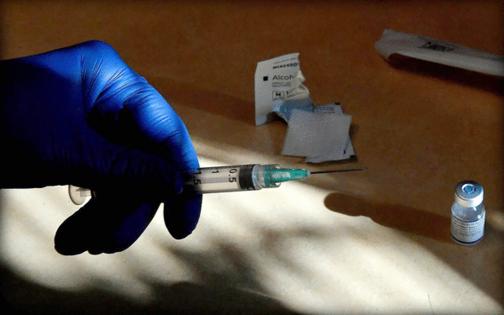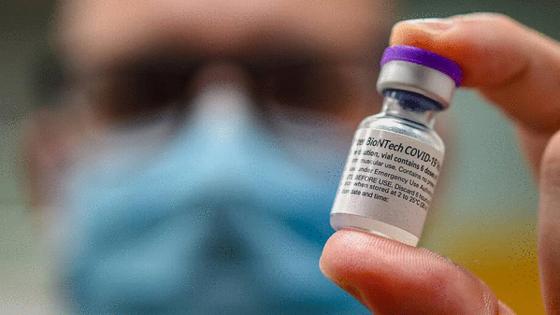Kansas vaccine law could be struck down
Published in News & Features
What attracted Katlin Keeran to occupational therapy for older adults was the chance to help provide them with dignity. Having enough mobility to get out of bed or use the bathroom yourself – those are the kinds of things that help maintain an individual’s independence.
So when Powerback Rehabilitation, which provides services at Town Village retirement community in Leawood, Kansas, offered Keeran a job in November 2022, she decided to take it. She soon realized Powerback required COVID-19 vaccinations for its employees. It was a step she wasn’t willing to take.
Keeran sought a religious exemption under a sweeping Kansas law that makes it virtually impossible for employers to deny COVID-19 vaccination exemption requests. But Powerback denied Keeran’s request, leading her to file a complaint with the Kansas Department of Labor. She never started the job.
“I wanted someone to be aware of what’s going on. I didn’t feel like it was right,” Keeran, a former Overland Park resident who’s now a traveling occupational therapist, told The Kansas City Star this week.
Over two years later, the state vaccine law is before the Kansas Supreme Court because of a legal dispute triggered by Keeran’s complaint. The justices, who heard oral arguments Wednesday, may strike down the law – a decision that could once again give employers more leeway to ensure their workers are vaccinated against COVID-19.
The Republican-controlled Legislature passed the law during a 2021 special session in response to federal vaccine mandates advanced by then-President Joe Biden’s administration. Democratic Gov. Laura Kelly signed the measure, which offers employees a broad ability to bypass their employers’ COVID-19 vaccine requirements.
The law, called HB 2001, allows employees to submit a written waiver request, accompanied by a statement signed by the employee. Employers are then required to grant it and are prohibited from “inquiring into the sincerity of the request.”
Lawmakers drafted the measure to apply only to COVID-19 vaccine mandates. Even though mandates largely fell out of favor as the pandemic ebbed, the outcome of the legal challenge will determine how much power businesses and organizations have to investigate exemption requests in case of a future resurgence, prompting new mandates.
The Kansas Department of Labor maintains that no conflict exists between state law and the federal vaccine mandate that was in effect at the time, which required health care providers receiving Medicare and Medicaid dollars to vaccinate their employees. Powerback, a Pennsylvania-based company that provides services nationwide, says differences between the state law and the federal mandate put the company in an untenable position.
The challenge also serves as a test case that could give lawmakers insight into whether expanding the broad exemption to other vaccinations could fly legally. Last month, the Kansas House passed a bill that would set a similar standard for day cares.
Vaccine hesitancy and opposition has only surged in recent years. Robert F. Kennedy Jr., the new secretary of the federal Health and Human Services, has undercut confidence in vaccines and his agency has cut funding for vaccination efforts. All of it comes amid growing outbreaks of measles across the country, including in Kansas, where at least 23 cases have been reported.
Keeran wasn’t aware the legal challenge centered on her experience was set for argument before the Kansas Supreme Court this week before The Star informed her on Monday. While she filed a complaint with the Kansas Department of Labor, she isn’t a party to the case.
Instead, Powerback and KDOL, which substantiated Keeran’s complaint, have been battling in court over the state vaccine law. Johnson County District Court Judge David Hauber issued a ruling in January 2024 siding with Powerback, finding the Legislature had overstepped federal law in HB 2001.
In an interview, Keeran declined to discuss her reasons for seeking a religious exemption. Hauber’s decision quoted her as stating, “I believe in seeking alternatives to vaccines made using cell lines from aborted fetuses.”
None of the COVID-19 vaccines contain aborted fetal cells. The Johnson & Johnson vaccine was developed using fetal cell lines, according to UCLA Health. The Pfizer and Moderna vaccines used fetal cell lines during testing.
Keeran said that when she applied with Powerback in the fall of 2022, she first did a phone interview and then received an in-person tour. Everything went well and the facility was nice, she said.
“I signed the offer letter and intended on starting and that’s kind of when the onboarding process began and they were asking for vaccination statuses and cards and I didn’t have that one,” Keeran said. At that point, she had already quit her old job.
A ‘perfect example’
When Keeran sought the religious exemption, Powerback pressed her on what other vaccines she had gotten, and she said a flu shot two or three years earlier.
“I am not familiar with this vaccine, but I decline to receive it as I am not familiar with it,” she said at the time, according to Hauber’s ruling.
Powerback decided Keeran’s request didn’t meet its exemption criteria and the company withdrew her job offer.
On Wednesday, an attorney representing Powerback acknowledged the company’s decision to ask Keeran about her request had violated state law. Still, the attorney, Melody Rayl, said the facts of the case provide a “perfect example” of why employers should be allowed to ask about religious objections.
“When Powerback did make the inquiry of Ms. Keeran, her response was, ‘well, heck, I don’t know, I don’t know enough about this vaccine and that’s why I don’t want to get it,’” Rayl told the Kansas Supreme Court. “And so it demonstrated it really wasn’t her sincerely held religious belief at all. She just didn’t trust the vaccine and didn’t want to get it.”
Powerback didn’t respond to a request for comment ahead of the oral argument. Town Village declined to comment.
Justice Dan Biles, appointed to the court in 2009 by former Democratic Gov. Kathleen Sebelius, suggested lawmakers had written the vaccine measure to effectively allow workers to game the system.
“It can also be fraud. I can check this box that says sincerely held religious belief, but the reason I don’t want to get this vaccine because I read something on the internet that told me not to take it,” Biles said.
Kansas Deputy Solicitor General Dwight Carswell, arguing for the Kansas Department of Labor, acknowledged Biles had a point.
“There is the risk of that, yes,” Carswell said.
But Carswell said that, “whether it’s good policy or not,” the Legislature had weighed whether to be under-inclusive of individuals with religious objections or over-inclusive and risk allowing exemptions for those seeking to game the system and had made a “rational determination.”
When lawmakers debated this bill in November 2021, supporters painted the measure as protecting freedom. “There are people that do not want to take this vaccine, even at the expense of their own lives. So we’re here defending that liberty,” then-state Sen. Dennis Pyle, a Hiawatha Republican, said.
While Kelly signed the bill, many Democratic lawmakers opposed it. Kansas Senate Minority Leader Dinah Sykes, a Lenexa Democrat, said the measure provided “a patina of support while putting Kansas businesses in an impossible position.”
Justice Melissa Standridge, a 2020 appointee of Kelly, asked about the practical consequences of the Kansas law rendering COVID-19 vaccine mandates basically toothless. Offering a stark hypothetical, she asked whether Powerback would have been vulnerable to lawsuits if Keeran had been hired and patients had died.
“If 10 patients would have died because they worked with this woman – I think she was an occupational therapist – during this heightened COVID, that’s when the big spikes came up,” Standridge said.
Carswell responded that Powerback providing a religious exemption as required by state law would likely be a defense in court.
The Kansas Supreme Court’s oral argument lasted roughly an hour. No timeline has been set for a decision.
Moving on
Even as lawyers argue over what her experience means for Kansas law, Keeran has largely moved on. She said that even if a court decision leads to a new job offer, she wouldn’t take it.
Keeran, who’s currently in Washington state, left Kansas last year. After Powerback took back its job offer, she spent a couple of months searching for a job, “which was rough at the holidays,” she said.
She remains steadfast in her belief that Powerback overstepped when it denied her exemption. After more than two years, everyone involved – Powerback’s attorney, the Kansas Department of Labor and herself – appears to agree the company didn’t follow the state vaccine law.
Whether the Kansas Supreme Court will find the state law unconstitutional remains an open question.
“I just have my own personal reasons,” Keeran said of her decision. “And I just feel like a job shouldn’t have a say over what decisions I make regarding my own health.”
------------
The Star’s Taylor O’Connor contributed reporting
©2025 The Kansas City Star. Visit at kansascity.com. Distributed by Tribune Content Agency, LLC.










Comments